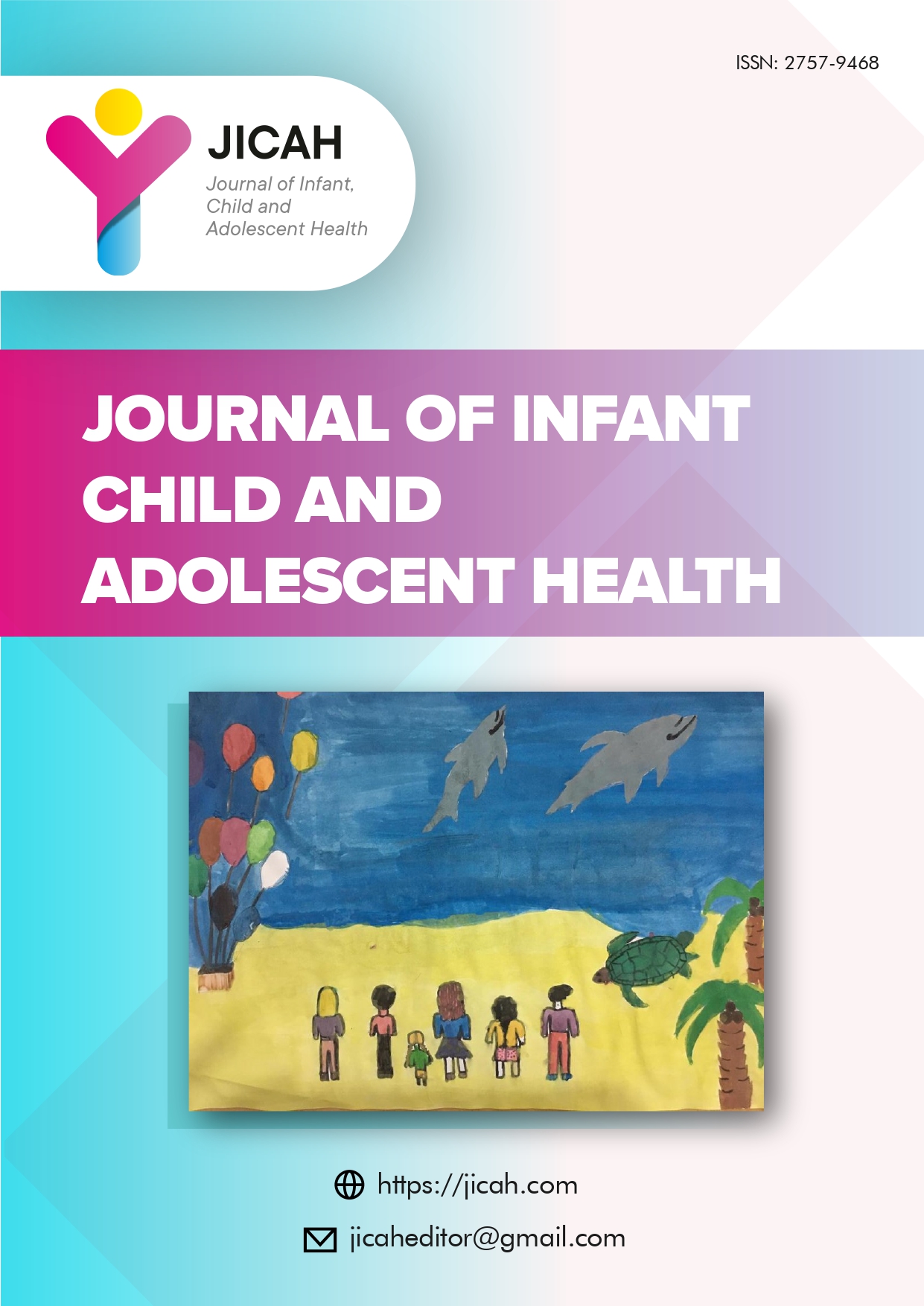Anxiety levels of pregnants and their attitudes towards breastfeeding during the Covid-19 pandemic
DOI:
https://doi.org/10.5281/zenodo.11092790Anahtar Kelimeler:
Breastfeeding, Covid-19, pregnant anxietyÖzet
Objective: This research aims to determine the level of anxiety experienced by pregnant women and their breastfeeding attitudes during the Covid-19 pandemic.
Methods: The sample of the descriptive study consisted of 482 pregnant women at the 32nd week of gestation and above. Personal Information Form, Breastfeeding Attitude Form and State Anxiety Inventory (DCI) were used as data collection tools during the Pandemic (Covid-19) process. The analysis process of the research data was examined under 4 headings. In the first stage, the distribution of demographic characteristics and descriptive statistics were examined, in the second stage, the construct validity of the survey used as a measurement tool in the study was examined, and in the third stage, the reliability of all scales was examined with Cronbach's alpha coefficient. In the fourth stage, the relationships between the scale scores were examined by correlation analysis. In our study, the Cronbach's alpha value of DCI was determined as 0.817. The Cronbach Alpha internal consistency coefficient of the breastfeeding attitude form prepared by the researchers is 0.717.
Results: The average age of 482 participants in the study was determined as 28.57 ± 5.334 years. The anxiety scores of pregnant women whose follow-up frequency did not change after the Covid 19 epidemic were found to be significantly higher than those whose follow-up frequency decreased. During the Covid-19 epidemic, the anxiety scores of those who received information about postpartum breastfeeding were significantly higher than those who received partial information. The anxiety scores of those who are considering not breastfeeding after birth due to the Covid-19 outbreak are significantly higher than those who are considering or partially considering breastfeeding.
Conclusion: It is important to train pregnant women online when on-site training is not possible during the Covid-19 outbreak. In the Covid-19, it is recommended to eliminate the thoughts and concerns of women about breastfeeding, and to evaluate and improve the knowledge, attitudes and behaviors of health personnel about breastfeeding, and to closely monitor the mental health of mothers and health personnel in this process.
Referanslar
Brazendale, K., Beets, M.W., Weaver, R.G., Pate, R.R., Turner-McGrievy, G.M,…..& Kaczynski, A.T. (2017). Understanding differences between summer vs. school obesogenic behaviors of children: The structured days hypothesis. Int J Behav Nutr Phys Act, 14(1), 100. https://doi.org/10.1186/s12966-017-0555-2.
Brooks, S.K., Webster, R.K., Smith, L.E., Woodland, L., Wessely, S.,…..& Greenberg, N.(2020). The psychological impact of quarantine and how to reduce it: Rapid review of the evidence. Lancet, 395(10227), 912-920, https://doi.org/10.1016/S0140-6736(20)30460-8.
Chen, Y.Y., Li, C.M., Liang, J.C. & Tsai, C.C. (2018). Health information obtained from the internet and changes in medical decision making: Questionnaire development and cross-sectional survey. J Med Internet Res., 20(2),e47. https://doi.org/10.2196/jmir.9370.
Ceylan, S. & Şahin, S. (2020). Comparison of breastfeeding self-efficacy and breastfeeding success of obese and normal-weight mothers in the early period. Afr Health Sci, 20(4), 2022-31. https://doi.org/10.4314/ahs.v20i4.60.
Ciesielski, T.H., Marsit, C.J. & Williams, S.M. (2015). Maternal psychiatric disease and epigenetic evidence suggest a common biology for poor fetal growth. BMC Pregnancy Childbirth, 15, 192. https://doi.org/10.1186/s12884-015-0627-8.
Coronavirus disease (Covid-19) pandemic. (21 September 2022). https://www.who.int/europe/emergencies/situations/covid-19
Durankuş, F. & Aksu, E. (2022). Effects of the Covid-19 pandemic on anxiety and depressive symptoms in pregnant women: A preliminary study. J Matern Fetal Neonatal Med, 35(2),205-11. https://doi.org/10.1080/14767058.2020.1763946
Evaluation and management considerations for neonates at risk for Covid-19. (20 September 2022). https://stacks.cdc.gov/view/cdc/88194
Grigoriadis, S., VonderPorten., E.H., Mamisashvili, L., Tomlinson, G., Dennis, C.L,….& Koren, G. (2013). The impact of maternal depression during pregnancy on perinatal outcomes: A systematic review and meta-analysis. J Clin Psychiatry, 74(4), e321-341. https://doi.org/10.4088/JCP.12r07968.
Kaplan, V. (2021). The burnout and loneliness levels of housewives in home-quarantine during Covid-19 Pandemic. Kıbrıs Türk Psikiyatri ve Psikoloji Dergisi, 3(2), 115-122. https://doi.org/10.35365/ctjpp.21.2.13
Köroğlu E.A.Ö. (2009). Psikiyatride Kullanılan Klinik Ölçekler. 7. Baskı. HYB yayıncılık, 390 p.
Lagan, B.M., Sinclair, M. & Kernohan, W.G. (2010). Internet use in pregnancy informs women’s decision making: a web-based survey. Birth, 37(2), 106-15. https://doi.org/10.1111/j.1523-536X.2010.00390.x
Li, F., Feng, Z.C. & Shi, Y. (2020). Proposal for prevention and control of the 2019 novel coronavirus disease in newborn infants. Arch Dis Child Fetal Neonatal Ed, 105(6), 683-4. https://doi.org/10.1136/archdischild-2020-318996
Mirzadeh, M. & Khedmat, L. (2022). Pregnant women in the exposure to Covid-19 infection outbreak: The unseen risk factors and preventive healthcare patterns. J Matern Fetal Neonatal Med, 35(7), 1377-8. https://doi.org/10.1080/14767058.2020.1749257
Özcan, H., Elkoca, A. & Yalçin, Ö. (2020). Covid-19 enfeksiyonu ve gebelik üzerindeki etkileri. Anatolian Clinic the Journal of Medical Sciences, 25(Special Issue on COVID 19), 43-50.
Poon, L.C., Yang, H., Lee, J.C.S., Copel, J.A., Leung, T.Y.….. & Zhang ,Y. (2020). ISUOG Interim Guidance on 2019 novel coronavirus infection during pregnancy and puerperium: Information for healthcare professionals. Ultrasound in Obstetrics & Gynecology, 55(5), 700- 708. https://doi.org/10.1002/uog.22013
Rasmussen, S.A., Smulian, J.C., Lednicky, J.A., Wen, T.S. & Jamieson, D.J. (2020). Coronavirus Disease 2019 (Covid-19 ) and pregnancy: What obstetricians need to know. Am J Obstet Gynecol, 222(5), 415-26. https://doi.org/10.1016/j.ajog.2020.02.017
Sources of healthcare information Turkey 2018. Statista. (21 September 2022). https://www.statista.com/statistics/890853/sources-of-healthcare-information-turkey/
World Health Organisation. (2020). “Coronavirus Disease”. https://www.who.int/emergencies/diseases/novel-coronavirus- 2019.
Yuksel, B. & Cakmak, K.(2020). Healthcare information on YouTube: Pregnancy and Covid-19 . Int J Gynaecol Obstet, 150(2), 189-93. https://doi.org/10.1002/ijgo.13246
İndir
Yayınlanmış
Nasıl Atıf Yapılır
Sayı
Bölüm
Lisans
Telif Hakkı (c) 2024 Journal of Infant, Child and Adolescent Health

Bu çalışma Creative Commons Attribution 4.0 International License ile lisanslanmıştır.



